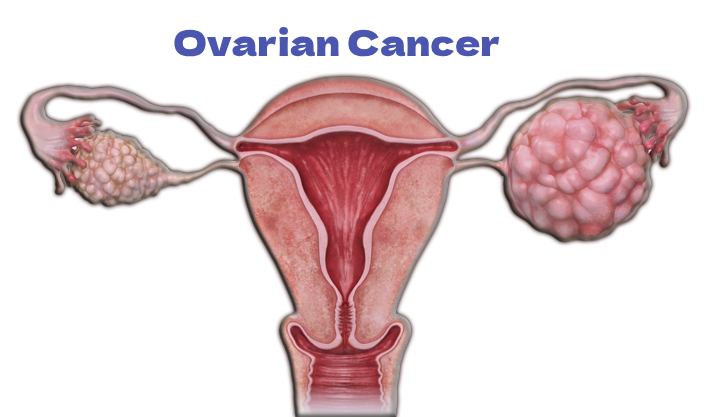Ovarian Cancer Treatment
Home > Gynae Treatments > Ovarian Cancer Treatment
An ovarian tumor refers to any abnormal growth or mass that develops within one or both ovaries. Ovarian tumors can be either benign (non-cancerous) or malignant (cancerous). These tumors can arise from different types of cells within the ovaries and may have varying characteristics and implications.
Benign Ovarian Tumors: Benign ovarian tumors are non-cancerous growths that do not spread to other parts of the body. They are often detected incidentally during routine pelvic exams or imaging tests. Most benign ovarian tumors do not cause significant health issues and can be managed conservatively or removed surgically if they cause symptoms or increase in size.
Malignant Ovarian Tumors (Ovarian Cancer): Malignant ovarian tumors, also known as ovarian cancer, are cancerous growths that can potentially spread (metastasize) to other organs and tissues in the abdomen and beyond. Ovarian cancer can be challenging to detect in its early stages, and symptoms may not be apparent until the disease has progressed. Early diagnosis and prompt treatment are essential for better outcomes in ovarian cancer cases.
There are various types of ovarian tumors, and their treatment and prognosis depend on factors such as tumor type, size, and stage. It is crucial for women to undergo regular gynecological check-ups to detect any ovarian abnormalities early and seek timely medical attention if any concerning symptoms arise.
Prof Dr. Rehana Aamer Khan stands as an eminent gynecologist and is renowned for her exceptional proficiency in treating ovarian cancer in Lahore Pakistan. She has earned her reputation as a leading expert in the field of treatment of ovarian cancer in Lahore, with a rich tapestry of experience and unwavering dedication. Dr. Rehana's comprehensive understanding of ovarian cancer intricacies empowers her to devise tailored treatment strategies, integrating the latest advancements in oncology.
Prof Dr. Rehana Aamer Khan fosters a compassionate and empathetic environment, understanding the emotional challenges that accompany a cancer diagnosis. She engages patients in informed discussions, ensuring they comprehend all available options, enabling them to make decisions in line with their values and preferences for treatment of ovarian cancer in Lahore.
Collaborating seamlessly with a multidisciplinary team, Prof Dr. Rehana Aamer Khan orchestrates holistic care that addresses not only the physical aspects but also the psychological and emotional dimensions of ovarian cancer. Her patients benefit from her tireless pursuit of the most effective and least invasive interventions, optimizing outcomes while prioritizing quality of life.
In the realm of gynecological oncology, Prof Dr. Rehana's name shines brightly as a beacon of expertise, hope, and compassionate care, making her the ultimate choice for those seeking optimal treatment for ovarian cancer in Lahore, Pakistan.
Ovarian tumors, including both benign and malignant (cancerous) , can cause a variety of symptoms. It's important to note that the symptoms of ovarian tumors can be nonspecific and similar to other common conditions, which can sometimes make early detection challenging. However, being aware of the potential symptoms is crucial in seeking timely medical advice and diagnosis. Some common symptoms of ovarian tumors/cancer include:

It is important to emphasize that these symptoms can be caused by various conditions other than ovarian tumors, and having these symptoms does not necessarily mean that ovarian cancer is present. However, if any of these symptoms are persistent, occur frequently, or are causing concern, it is crucial to seek medical evaluation by a Gynecologist. Early detection and prompt diagnosis are essential for the effective management and treatment of ovarian tumors or cancer.
The diagnosis of an ovarian tumor typically involves a combination of medical history assessment, physical examination, imaging studies, and sometimes, additional diagnostic procedures. Prompt and accurate diagnosis is essential for determining the nature of the tumor and developing an appropriate treatment plan. Here are the main steps involved in diagnosing an ovarian tumor:
Physical Examination
The doctor can take detailed medical history, including any symptoms experienced by the patient. They will also perform a pelvic examination to assess the size and position of the ovaries and check for any signs of abnormalities.
Ultrasound & MRI or CT Scan
Ultrasound: Transvaginal ultrasound or abdominal ultrasound is often the first imaging test used to evaluate ovarian tumors. It provides a detailed view of the ovaries and helps identify the presence, size, and characteristics of the tumor.
MRI or CT Scan: In some cases, MRI or CT scan may be recommended to obtain more detailed images of the ovaries and surrounding structures.
Blood Tests:
CA 125 is a blood test to measure the level of CA-125, a tumor marker that may be elevated in some ovarian cancers. However, it is essential to note that CA-125 levels can be elevated due to other conditions as well. In certain cases, additional blood tests may be ordered to assess other tumor markers associated with ovarian cancer or specific types of ovarian tumors.
Biopsy or Tissue Sampling
In cases where the imaging and blood tests raise suspicion of a malignant ovarian tumor (cancerous tumor), a biopsy or tissue sampling may be performed. This can be done through a laparoscopic procedure (minimal invasive surgery) or, in some cases, through open surgery. The obtained tissue is then examined by a pathologist to determine whether the tumor is benign or malignant.
Early detection and timely diagnosis are crucial for better treatment outcomes, particularly in cases of ovarian cancer. Therefore, any persistent pelvic symptoms or abnormalities should be promptly discussed with your doctor for further evaluation.
The treatment of ovarian tumors or ovarian cancer depends on several factors, including the type and stage of the tumor, the age and overall health of the patient, and whether the tumor is benign or malignant. Treatment options may involve a combination of surgery, chemotherapy, and sometimes radiation therapy. The main treatment modalities for ovarian tumors/cancer are as follows:
Minimal Invasive Surgery
Minimal Invasive Surgery is often the primary treatment for both benign and malignant ovarian tumors. The extent of the surgery depends on the nature and stage of the tumor. In early-stage ovarian cancer, the surgeon may perform a procedure called a total laparoscopic or robotic hysterectomy, which involves the removal of the uterus and both ovaries.
Chemotherapy
Chemotherapy involves the use of powerful drugs to destroy cancer cells or inhibit their growth. It is often used in conjunction with surgery to treat advanced-stage ovarian cancer or cases where the tumor has spread to other parts of the body.
Targeted Therapy
Some types of ovarian cancer may respond to targeted therapy drugs that specifically target cancer cells' abnormalities while sparing healthy cells.
Hormonal Therapy
For certain types of ovarian tumors, such as hormone-sensitive tumors, hormonal therapy may be used to block or reduce the effects of hormones that promote tumor growth.
Radiation Therapy
Radiation therapy is not commonly used for treating ovarian cancer, but in some cases, it may be recommended to target cancer cells in specific areas.
Palliative Care
In advanced stages of ovarian cancer, palliative care may be provided to manage symptoms, improve quality of life, and provide emotional and physical support.
Treatment decisions are highly individualized, and our medical team of minimal invasive surgery will work closely with your patient to develop a treatment plan that considers the specific characteristics of the tumor and the patient's overall health and preferences. Early detection and prompt treatment can significantly improve the prognosis and outcome for individuals with ovarian tumors or cancer.

Our best minimal invasive surgery (laparoscopic surgery) team in Lahore stands at the forefront in providing top notch care for ovarian cancer patients. We employ best available technology to perform precise and minimally invasive procedures with skilled gynecological oncologists and laparoscopic surgeons. Our patient-centric approach ensures personalized treatment plans, coupled with compassionate support throughout the treatment. With laparoscopic surgery or robotic surgery, our patients experience smaller incisions, reduced postoperative pain, shorter hospital stays, and faster recovery times, enhancing their overall well-being and quality of life. Each patient is treated as an individual, and our team believes in personalized care, tailoring treatment plans to suit their specific needs and medical requirements. Our comprehensive approach to ovarian cancer includes not only surgical expertise but also collaboration with other specialists, such as medical oncologists and radiation oncologists, to ensure the most effective and holistic treatment outcomes. We are at the forefront for treatment of ovarian cancer/tumor in Lahore.
Contact UsCopyright @ . Design By Blizin Technologies